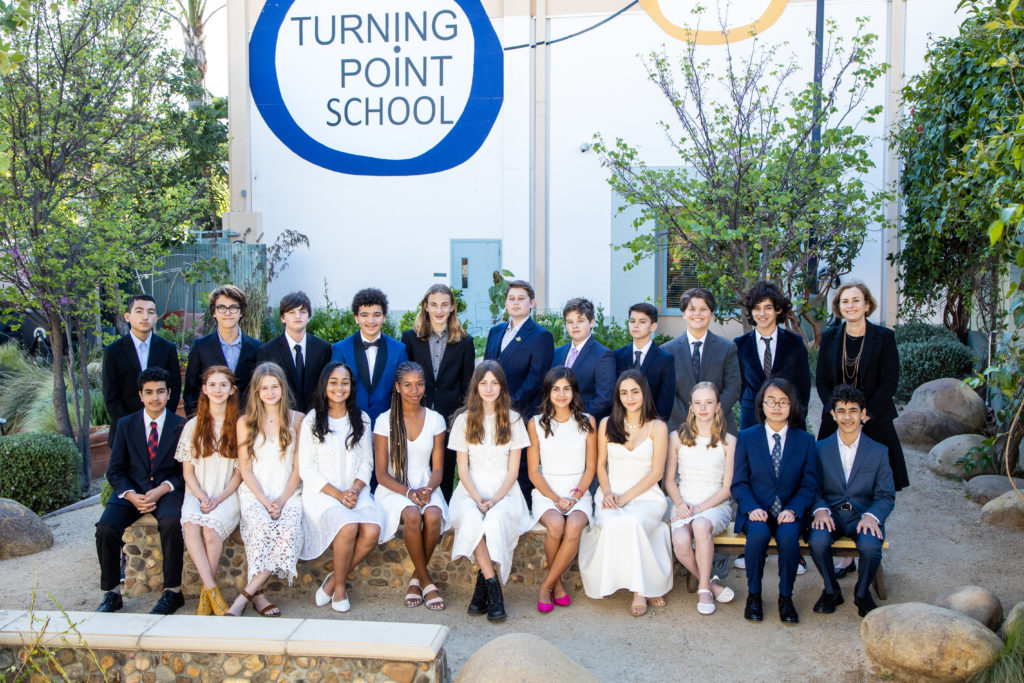
Last week we sent off our graduating eighth-grade students—my son, Jack, among them—to a rich variety of excellent high schools that are as unique and promising as our students themselves. Our students’ placements and acceptances demonstrate how sought-after Turning Point graduates are, and we know these high schools will benefit from their sharpened critical thinking ability to engage in intellectual rigor, incisive logical reasoning, excellent communication skills, emphasis on social justice, and confidence in their ability to impact the world in positive ways.
As educators and parents, our purpose is to foster the growth and development of children to prepare them for increasing independence and agency. I am proud of the accomplishments of our students and marvel at their growing maturity and poise. And yet, as a parent, I am familiar with the longing to sometimes slow time down and treasure our children’s diminishing childhood as these cherished stages give way to something equally profound. In other words, I have mixed feelings as another year draws to a close.
The end of the year is a time of transitions, which necessitates change. Our children feel this passage, and the energy that accompanies it, as do we. When I moved to Los Angeles three years ago, a friend gave me a copy of William Bridges’ classic, Transitions: Making Sense of Life’s Changes. Whether your child is transitioning to a new high school, a new division within Turning Point, or just to a new grade level, many unknowns loom on the horizon, and it helps to acknowledge our internal responses during these times of flux.
Change can be uncomfortable, so sometimes we leapfrog over what Bridges calls the three stages of transitions: an ending; a period of confusion or distress; and, finally, a new beginning. Every transition begins with an ending, and we have to let some things go before we can pick new things up. Endings can be difficult for us to tolerate, as they can kick up some past history or emotional baggage. According to researcher Brené Brown, transitions can bring up many different fears, as well as vulnerability, because the rules we have lived by for some time no longer apply.
As a parent, I have been wondering: will my older son’s high school advisor be as attuned, wise, and supportive as his middle school advisors were? My impulse is to control the outcome, but I will resist calling his new school to ask about ninth grade advisors and trust that he will benefit from any scenario because he will have to adjust accordingly, which I know fosters growth. Instead, I will try to allow myself to feel grief that he is leaving this rich and productive stage of his educational journey to make room for my excitement about his next adventure.
Between endings and beginning, we must make room for a limbo state, where things are unresolved as we wait for things to begin anew. We linger here, bereft of our old identities and without our former reality. We say students are “rising” to the next grade level; they are in transit, betwixt and between. It’s a space that is held for a new identity to gestate. Summer provides this opportunity to break from our routines and regular existence. We have different daily schedules. This departure from the ordinary helps us create new ways of responding to our lives, since we cannot fall back on mindless habits and rituals. This time lends itself to self-reflection but also makes us feel like nothing is solid and dependable. This realization can be unsettling, but also freeing. Anything is possible!
Finally, we are primed for our new beginnings. Bridges recommends we “take things step by step and resist the siren song that sings about some other route in which everything goes smoothly.” So, I encourage you to try not to become preoccupied with results, which can be damaging; instead, “shift your purpose from the goal to the process of reaching the goal.”
Think about what might await your child next year or in years to come: designing an experiment and documenting the process, increasing reading stamina, creating monologues to speak against injustice, developing a budget, traveling to a new city or country, analyzing symbolism in a core novel, balancing pride with awareness of others’ feelings, understanding the principles of geometry, learning to share, making amends, speaking in public, developing and defending a point of view, going on interviews, listening to a friend, cheering on peers, surveying community needs, remembering homework, rebounding after setbacks, imagining the lives of others different from you, marrying a passion with improving the world. These are the incremental, steady steps we watch our students make as they happily pursue fulfillment, grace, and fellowship.
Research shows that gratitude fosters resilience during transitions. When I look back at the year and reflect upon the many successes, I feel deep gratitude for everyone in our Turning Point community. I am honored to be among your children, who inspire me to be the best version of myself. I am grateful for all the support of our wonderful parents, who entrust us with your children each day. And I am grateful to work with a talented, dedicated, intelligent, faculty and staff committed to honing their craft and knowing our students deeply—resulting in a transformational educational experience for all.
Savor these waning moments of the school year, and remain present with the joy, pride, love, and even the longing each milestone and celebration brings. As always, I am honored to share these moments with you.
Warmly,
Laura
Laura Konigsberg
Head of School
lkonigsberg@turningpointschool.org


































